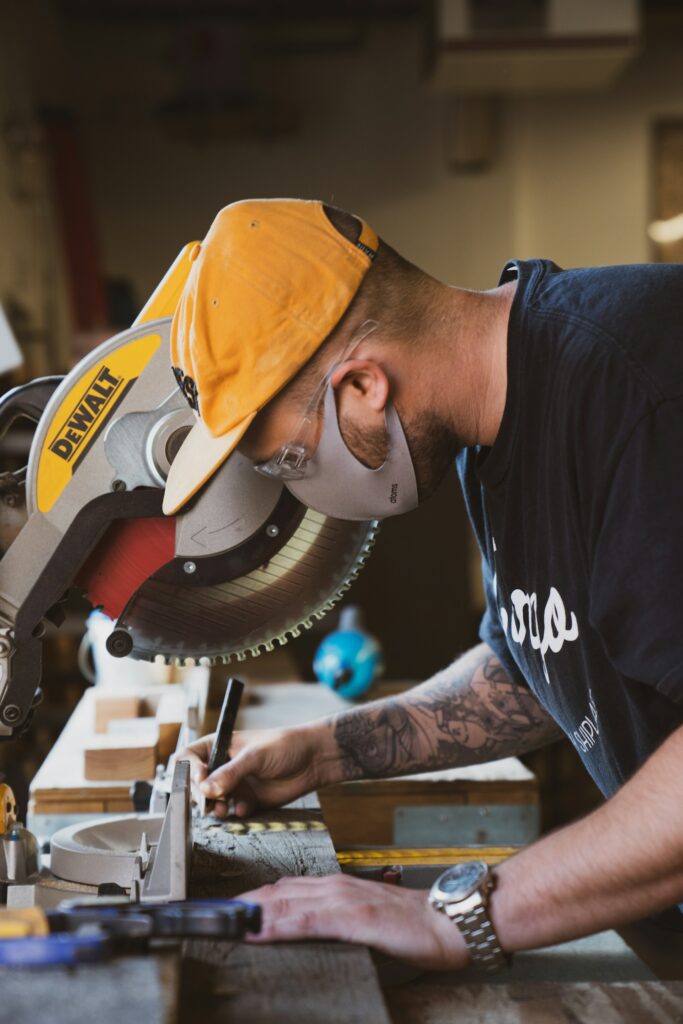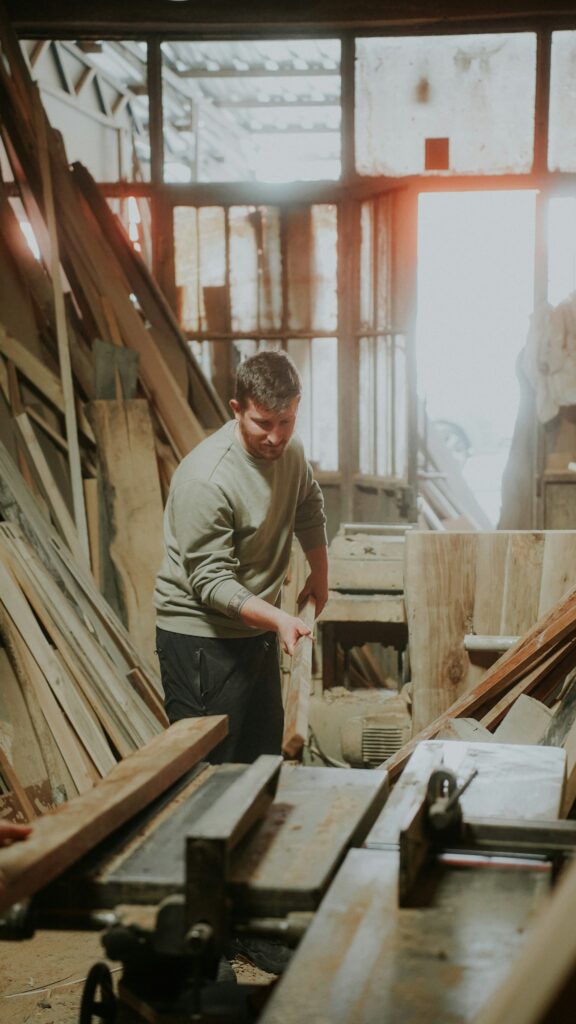 With carpenter jobs in the UK, you can have a successful career with good earnings. Have you ever pondered what it takes to create robust structures out of empty spaces or to turn raw wood into exquisite furniture? This potential is provided by carpentry, which blends traditional workmanship with contemporary building methods. Knowing what carpentry entails will help you make an informed choice about this fulfilling occupation, whether you’re thinking about changing careers or just starting your career.
With carpenter jobs in the UK, you can have a successful career with good earnings. Have you ever pondered what it takes to create robust structures out of empty spaces or to turn raw wood into exquisite furniture? This potential is provided by carpentry, which blends traditional workmanship with contemporary building methods. Knowing what carpentry entails will help you make an informed choice about this fulfilling occupation, whether you’re thinking about changing careers or just starting your career.
The United Kingdom has a long history of carpenter jobs, with talented craftsmen turning wood into functional and beautiful products for generations. Carpenter jobs range from designing and building furniture to framing major constructions, such as roads and bridges. If you enjoy working with your hands and applying your talents to create something concrete, a career in carpentry could be a good fit.
Read Also: Health Insurance in the UK
Important Skills for Carpenter Jobs in the UK
-
Physical agility and endurance
Being a hands-on job, carpentry demands accuracy, hand-eye coordination, and the ability to work long hours.
-
The ability to solve problems
As you work, you’ll encounter obstacles, so it’s essential to think critically, assess situations, and devise innovative solutions to ensure that projects meet timelines and client requirements.
-
Paying close attention to details
To guarantee precision in measurements, cutting, and project quality overall, a sharp eye for detail is essential. Even small discrepancies can have an impact on the end product’s appearance and functionality.
-
Mathematical ability
You will need strong arithmetic skills to compute measures, angles, and numbers. You will also be expected to interpret and translate plans and blueprints into their real-world counterparts.
-
Teamwork and communication
Some carpentry work can be completed alone, but many projects require collaboration. Effective communication with coworkers, clients, and architects is vital for project success.
-
Safety awareness
Working in a construction site necessitates a strong commitment to safe measures. You must be aware of health and safety rules and understand how to use various instruments properly.
Read Also: UK Visa Sponsorship Openings Worth £15,000
What Are Carpenter Jobs Like?
 Working with wood is just one aspect of carpenter jobs. Carpenters shape the spaces in which people live and work by constructing elaborate furniture items and building home frames. Most carpenters start their careers in building carpentry, where they learn how to create frameworks for houses and other structures. As their skills improve, many move on to finishing carpentry, which involves more detailed work such as cabinet installation and trim work. Some find their calling in workshop settings, creating custom furniture or specialized wooden fittings. Other carpenters will enter the maintenance sector, becoming more of a “multi-trader” and working in vacant or inhabited properties. This could be social housing or massive commercial buildings.
Working with wood is just one aspect of carpenter jobs. Carpenters shape the spaces in which people live and work by constructing elaborate furniture items and building home frames. Most carpenters start their careers in building carpentry, where they learn how to create frameworks for houses and other structures. As their skills improve, many move on to finishing carpentry, which involves more detailed work such as cabinet installation and trim work. Some find their calling in workshop settings, creating custom furniture or specialized wooden fittings. Other carpenters will enter the maintenance sector, becoming more of a “multi-trader” and working in vacant or inhabited properties. This could be social housing or massive commercial buildings.
Your regular work as a carpenter may include reading intricate designs one moment and accurately cutting materials the next. Most carpenters operate in a variety of environments, adapting their talents to each particular situation. This variation makes each day unique, providing both difficulties and chances to expand your knowledge. Most days begin about 7.30 a.m., and you will be assigned a task to do for the day, such as erecting timber frames or performing second-fix work on completed projects. You could be constructing staircases, putting in roof joists, or installing kitchen cabinets. The task is physically demanding, requiring strength and stamina as you lift items and use tools all day.
Safety is important in daily operations. You will use a variety of tools, ranging from traditional hand planes to sophisticated power equipment, all of which require certain safety precautions. As you gain experience, paying attention to safety becomes second nature, and it becomes an important element of your professional skill.
Read Also: UK Companies Hiring Foreigners with Visa Sponsorship Right Now
What Do Carpenters Do?
A carpenter’s daily activities might vary greatly based on the type of job they do. Depending on the site and project, a carpenter may be responsible for:
- Reviewing technical plans and instructions with site managers and clients.
- Cut and shape materials for doors, frames, flooring, and other internal features.
- Creating and installing structures, including floor joists, roof timbers, partition walls, staircases, and door frames.
- Fitting out public buildings, offices, stores, pubs, and restaurants
- Building supports to keep the concrete in place as it dries (shuttering)
- Making frames for bigger external structures like buildings, bridges, and highways.
- Building stage sets for TV, film, and theater performances.
- Restoring historic buildings
- Assembling freestanding or fitted furniture
- Installing kitchens, cabinets, and shelves.
Read Also: Civil Engineering Jobs in UK with Visa Sponsorship
What is the Difference Between a Carpenter and a Joiner?
 The difference between these two vocations is that a joiner creates a wooden item from scratch, whereas a carpenter installs or repairs it in place. While many of the abilities required for these professions are similar, a joiner may not be the greatest candidate to install a window frame. Similarly, a carpenter may not be the best candidate to construct the window frame in the first place. A carpenter may also be referred to as a ‘chippie’. This phrase can also refer to joiners.
The difference between these two vocations is that a joiner creates a wooden item from scratch, whereas a carpenter installs or repairs it in place. While many of the abilities required for these professions are similar, a joiner may not be the greatest candidate to install a window frame. Similarly, a carpenter may not be the best candidate to construct the window frame in the first place. A carpenter may also be referred to as a ‘chippie’. This phrase can also refer to joiners.
What Does a Joinner Do?
A joiner, as the name implies, is someone who joins pieces of wood together to form an item, such as a flight of steps, a cabinet, or a doorframe. This is in a workshop on a bench, rather than on a construction site or in a client’s home. Because they do not have to transport their equipment, joiners frequently employ larger tools and machinery such as mains-powered saws or sanding wheels. Although joiners produce goods in a workshop, they may need to visit the job site to measure. For example, if a fitted wardrobe is required, the joiner must first determine the measurements of the wall or alcove into which it will fit before beginning work on it. Joiners frequently create bespoke furniture, although they may also work on commercial, mass-produced furniture. A joiner may create bookshelves, tables, and wardrobes.
What Do Carpenters Do?
Carpenters, on the other hand, have a greater degree of flexibility in terms of working location. Their task is to install and repair wooden items, many of which have been created by joiners. As a result, they are typically found working on building sites or in the homes of clients. As a result, carpenters employ lighter tools that they can transport on their bodies, in a tool belt, bag, or box, or in a vehicle. A carpenter may work on fitting roof timbers, putting down floorboards, and fitting stairs. Also, they handle fitting partition walls, installing skirting boards, and hanging doors. Other responsibilities can be fixing window frames and installing cupboards and shelves.
Read Also: Student Jobs in the UK
Similarities Between a Carpenter and a Joiner
Despite their differences, carpenters and joiners work in the construction industry, and there is often a lot of overlap between the two. In general, a person will train in woodworking and learn the fundamentals of carpentry and joinery before deciding to specialize in one or both. As a result, there are many transferable skills, and many joiners and carpenters may be able to do duties that are more suited to the other profession. Furthermore, a person may train as a joiner and then as a carpenter, or vice versa, to broaden their knowledge and skill set. Requirements include attention to detail and strong math skills, especially in arithmetic and length conversions. The ability to understand architectural drawings and plans and basic woodworking skills are some of the similarities.
What Type of Insurance Do Carpenters and Joiners Need?
 Although the work they undertake may differ, carpenters and joiners frequently require similar insurance plans to protect their cash. While it is not a requirement by law for a joiner or carpenter to obtain all of these insurances, doing so can reduce the possibility of major financial implications if an accident or complaint arises as a result of their job.
Although the work they undertake may differ, carpenters and joiners frequently require similar insurance plans to protect their cash. While it is not a requirement by law for a joiner or carpenter to obtain all of these insurances, doing so can reduce the possibility of major financial implications if an accident or complaint arises as a result of their job.
-
Public Liability Insurance
This sort of insurance covers you if a client files a claim against you for damage, injury, or property loss incurred while on the job. Public liability insurance is not legally needed, but clients might make it a condition of your contract of employment. This insurance can protect you if, for example, a client trips over a wire and sustains an injury while picking up a cabinet from your workshop, or if you accidentally damage a client’s flooring while installing a staircase in their home.
-
Tool and equipment insurance
As the name implies, this form of coverage protects you if your tools or equipment are misplaced, damaged, or stolen. For example, despite being closed and guarded, your workshop or truck could be broken into and your tools taken. If this type of catastrophe occurs, tools insurance can help you return to work as soon as possible.
-
Employer liability insurance
If you are a self-employed carpenter or joiner, you only require employers’ liability insurance if you have employees. This policy covers you if your employees become ill or sustain injury while working for you, and it is a requirement by law for all companies.
Read More About: Health Insurance in the UK
Steps to Carpenter Jobs
There are various options for becoming a carpenter or joiner. You can obtain the necessary qualifications by taking a college course or completing an apprenticeship. Investigate these options to determine which one is best for you. Although some possibilities include qualification requirements, many businesses prefer people who are eager to learn and can follow directions. To work on a construction site, you may have to hold a Construction Skills Certification Scheme (CSCS) card.
-
College or training provider
Some institutions offer part-time, short courses in carpentry and joinery, which may be an excellent method to determine whether working with wood/timber is for you, especially if you have no experience or are considering changing careers.
-
Apprenticeship
A construction apprenticeship in carpentry and joinery is an excellent method to start the profession. Apprenticeships are available to everyone over the age of sixteen. As an apprentice, you will work at least 30 hours per week for your firm. Your time will be divided between on-the-job experience and a college or training facility. An intermediate carpentry and joinery apprenticeship takes about two years to complete. If your employer can offer you the necessary expertise, you may be able to proceed to higher-level certifications or specialize in heritage and historical renovation, as well as furniture/cabinet manufacturing. You may need GCSEs (including English and maths) to pursue an apprenticeship, but not all firms require formal qualifications.
-
Work Experience
Work experience is vital for obtaining a job in the construction business. You could learn this at school or by working weekends and holidays for a construction company or relative. Potential employers would always appreciate seeing work experience on your CV.
-
Skills
Additional skills that may aid anyone considering a job as a carpenter are the ability to operate, repair, and maintain machinery and tools. Also, carpenters need knowledge of building and construction. Furthermore, you need design talents and knowledge for carpentry. Also, you must demonstrate thoroughness, attention to detail, and excellent verbal communication abilities. You must be able to work effectively with others and use your initiative. Finally, a carpenter must be capable of using a computer and the key software programs with confidence.
How Long Does It Take to Get Good at Carpenter Jobs?
Becoming proficient in carpentry jobs is a journey with no set schedule, because “being good” might imply different things depending on your objectives. For someone wishing to do personal tasks or house upgrades, a year of concentrated practice, study, and small project accomplishment could result in a comfortable competence level. This timeframe provides for the examination of basic techniques, tool familiarization, and material behavior comprehension.
However, for those interested in professional carpentry or a woodworking career, the options are more diverse. Formal apprenticeships or vocational programs are frequently selected paths, combining classroom study with hands-on practice. These can last anywhere from 3 to 4 years, and are driven not just by the need to learn skills but also by the need to gain experience in a variety of tasks and settings. During this time, apprentices learn both the “hows” and “whys” of carpentry, which is essential for mastering the profession.
Experience is crucial in the carpentry industry, and mastery in the craft is frequently correlated with years of practice and further education. Long into their careers, carpenters frequently learn new methods, strategies, and tactics. There is a constant pursuit of advancement and adjustment to new materials and technology.
Read Also: UK Care Assistant Jobs with Visa Sponsorship
Best Way to Learn Carpentry
A classic and very successful way to learn carpentry is through apprenticeships. They combine classroom education with on-the-job training, giving students a theoretical foundation and enabling them to obtain real-world, hands-on experience. This approach offers the chance to learn directly from seasoned pros while also facilitating the development of a thorough understanding of carpentry methods and supplies. Apprenticeship is a financially viable choice for many because it also pays apprentices while they train. Another great way to learn carpentry is through formal instruction at community colleges or vocational institutions. From fundamental woodworking skills to sophisticated construction methods, these institutions provide structured programs that cover a wide range of subjects.
Through workshops and labs, classes, teachers offer both theoretical knowledge and real-world experience. For people who want to gain a thorough understanding of carpentry in a short amount of time, this path is especially advantageous. Conversely, DIY learning provides the greatest flexibility. Motivated people can learn carpentry on their own thanks to the wealth of online resources, such as forums, videos, and tutorials. With this method, students can customize their education to fit their interests and learning style. However, it necessitates access to practice equipment and materials, as well as a high degree of self-motivation and discipline.
How Much Do Carpenter Jobs Pay in the UK?
Depending on geography and experience, carpentry offers different financial opportunities. While qualified professionals make between £30,000 and £40,000 a year, apprentice carpenters usually start at roughly £14,000. People who start profitable independent enterprises or focus on high-end jobs frequently make a lot more money. In the UK, there is still a high demand for qualified carpenters, and the rising popularity of traditional craftsmanship and sustainable building methods bodes well for individuals wishing to pursue careers in the industry.
Read Also: Warehouse Jobs in UK With Visa Sponsorship
Final Thoughts
Carpenter jobs in the United Kingdom offer flexibility and satisfaction in an evolving world. The responsibilities are engaging, and you can work in different locations. If you love creativity, consider working carpenter job in the United Kingdom. There is a steady demand for carpenter jobs with a high-earning potential.
